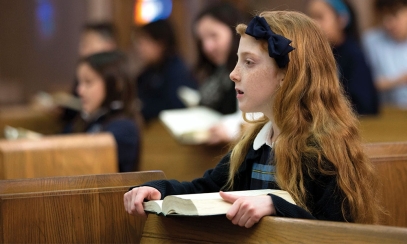
How Can Families Practice the Works of Mercy? - Visit the Imprisoned
March 14, 2023 | “I was hungry and you gave me food, I was thirsty and you gave me drink, a stranger and you welcomed me, naked and you clothed me, ill and you cared for me, in prison and you visited me.”
March 14, 2023 | “I was hungry and you gave me food, I was thirsty and you gave me drink, a stranger and you welcomed me, naked and you clothed me, ill and you cared for me, in prison and you visited me.”
Jesus’ powerful words in the Gospel of Matthew form the basis for the traditional list of the works of mercy. When it comes to meeting physical needs, the Compendium to the Catechism of the Catholic Church lists the following actions as the corporal works of mercy:
- Feed the hungry
- Give drink to the thirsty
- Clothe the naked
- Shelter the homeless
- Visit the sick
- Visit the imprisoned
- Bury the dead
How can families live this out? Especially with young children, hands-on charitable work can be daunting, but not impossible. The works of mercy will look different for each family – and can be practiced very literally when it comes to caring for children! But if you have a desire to introduce your children to acts of charity outside the home, I hope these ideas can be a gentle nudge to step out as the domestic Church and seek encounters with those in need.
Visit the imprisoned
As with “burying the dead,” visiting the imprisoned might seem, at first glance, a work of mercy that’s out of reach for most families. How is that supposed to work with young children?
Let’s back up and think about aspects of our society that can create isolation, loneliness and even a feeling of imprisonment. Even before the COVID-19 pandemic, the “loneliness epidemic” was being acknowledged, and studies continue to confirm its prevalence, including among young adults and parents of young children. We could go on for pages about the causes, but in the end, chances are high that someone near us feels miserably alone – even in the busyness of family life.
I’ve seen this in mothers who love their babies and are grateful to be able to stay home with them, but feel like their only interaction with adults comes through their smartphones. For others, isolation might come in the form of a diagnosis or disability that impedes routines and socializing. When it’s difficult to leave the house or commit to invitations for any reason, loneliness can creep in, and even the most loving home can feel confining. A single parent juggling the roles of two; someone with a spouse on military deployment or working irregular hours – these are situations not uncommon to our experience as families, and they can all contribute to people losing connections and chances for friendship. How can we remain sensitive to these needs? When friends might feel constrained by their current circumstances, are we willing to go to them, and to keep offering our friendship?
And while visiting literally incarcerated people isn’t possible for most families, writing letters is. One place to start would be a diocesan prison ministry, if they’re equipped to set up volunteers with an incarcerated pen pal. Another option is the Order of Malta Pen Pal Program (orderofmaltafederal.org/prison-minsitry), which enrolls volunteers from across the country.
I can understand why some families might hesitate at the thought of involving their children. Is it safe? What would you even write about?
To the first point, I’ll say that every program I’ve encountered takes great pains to protect letter writers’ privacy – and to make sure you know how to maintain an appropriate relationship with your pen pal. As to the second question, I asked a friend who has done this for many years, and she pointed out that many prisoners are estranged from their own families. Having communication coming from the heart of family life can be deeply meaningful.
If you’re looking for a practice to take up this Lent, consider whether writing letters to incarcerated people might be a work of mercy for your family. Regardless of how you practice visiting the imprisoned, may you and your family bring the light of Jesus into some of the dark, lonely corners of your world.
Elizabeth Hansen and her husband, Luke, raise their four children in Lansing, where they attend Resurrection Parish.



